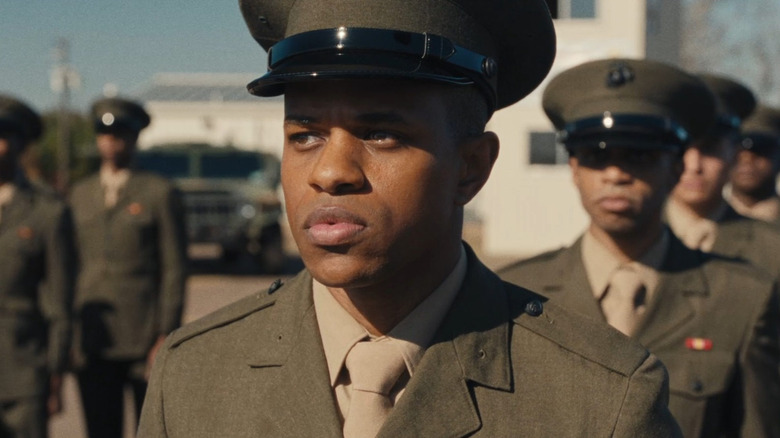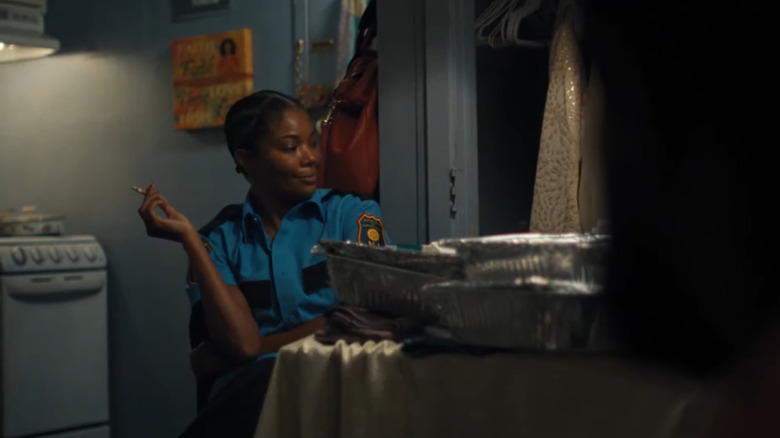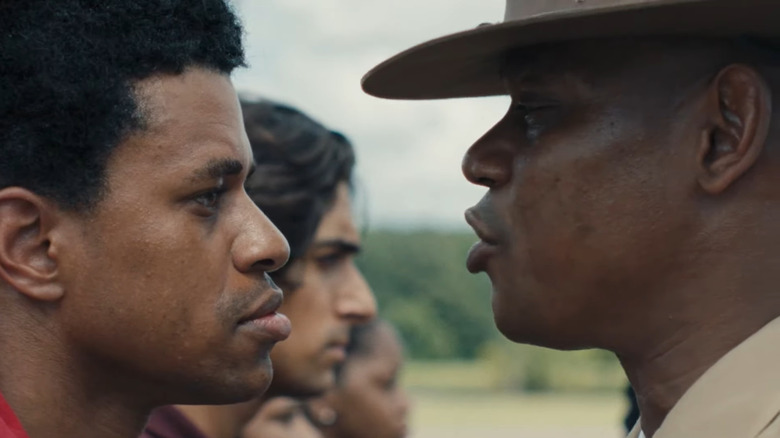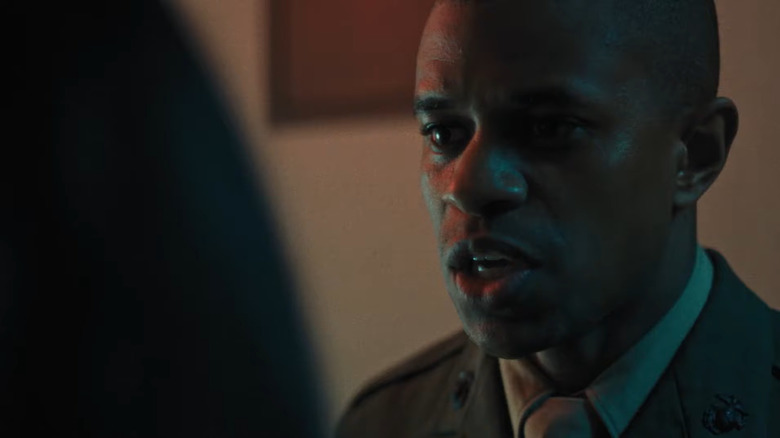With The Inspection, Elegance Bratton Made A 'Pro-Troop Film' Based On His Experiences [Exclusive Interview]
"The Inspection" is writer-director Elegance Bratton's first feature film, and it's certainly a great start. The movie follows Ellis French (Jeremy Pope), a young, Black, gay man in the early 2000s who decides to join the Marines with the goal of escaping homelessness and winning back the love of his homophobic mother. It's a brutal yet ultimately hopeful movie, one made even better by the standout performances from Pope and Gabrielle Union. As anyone who's seen it already can tell you (including our own reviewer Chris Evangelista), it's definitely worth the watch.
It's a heavily autobiographical film, with Bratton drawing from his own experiences going through the same situation. Bratton was nice enough to talk with /Film about his experience making "The Inspection" and the unique challenges and advantages that come with writing and directing a story so closely linked to one's own life.
'French is a more heroic version of myself'
I understand that this is a very autobiographical film, with French's whole character arc very strongly based on your life. What would you say is the biggest departure, the biggest creative liberty that you took with the movie?
The movie is 100% autobiographical when it comes to the hopes, fears, desires, and primary motivations of our lead character, even if it's not something I necessarily went through. I think the most meaningful departure ... I don't want to give spoilers, though, because it comes towards the end of the movie, but French is a more heroic version of myself. When I was in bootcamp, I was literally trying to blend into the background. I was in identity camouflage. I don't even know how to describe it. I knew who I was. My name is Elegance, you know what I'm saying? Any room I walk into, everyone assumes I'm gay.
Before they meet me, they just assume it because of my name, so there's nowhere for me to hide. That's why this movie's not about someone who's debating whether or not they're queer. It's about someone who knows who they are and has to figure out how to make a way through an impossible situation. This is really a story about a guy who's going through anything to win back his mother's love, who ultimately learns how to respect himself. I'm trying to think of something specific that isn't a spoiler, but I'll just say it then: The makeup scene, I would never ever have done that.
Yeah, I was going to ask about the makeup scene.
Yeah, that didn't happen, but you know what's funny is that I'm obsessed with drag and anything that's people transforming, I'm just completely fascinated by it. When I got to boot camp, while I didn't necessarily put on drag makeup, I put on my war paint expertly and I put on everybody else's war paint as well. I was helping people. You know what I'm saying? They didn't know that I picked up those skills by hanging out with drag artists, trans women, but I knew that.
This isn't about recollection for me in terms of the autobiography — it's about emotional truth. What does it feel like to be a Black gay man in bootcamp at this moment in history and time? And what did I learn from that experience, is really what it's about. With Jeremy's help, we were able to make French into a version of ourselves that could be the hero. In real life, I'm a code switcher like French, but also I can be a bit more conservative in a way, in how I present myself.
Is there any scene in the movie that you're particularly excited or nervous about people seeing?
Anything with my mother in it. While the movie is autobiographical in its desires and its formulation, it's totally accurate when it comes to the relationship between French and his mother. I'm very grateful for Gabrielle [Union] to be in the film, because she really brought my mother back to life and provided an opportunity, I think, for people who are homophobic and people who are — this whole movie is about causing a conversation between the left and the right. It's about our implicit value as human beings being our ability to protect one another. This is what French learns in bootcamp that transforms him.
This is what I want the film to give to people. For those individuals who can't accept gay people or can't accept their gay children, I hope they see Gabrielle's performance and they see her humanity and they see French not give up on her and French not judge her, this radical defiant empathy. I hope that they take something from that and they treat their queer children better, and queer people in general better.
'The whole point of this film is radical defiant empathy'
There's a scene where Laws (Bokeem Woodbine) and Rosales (Raúl Castillo) are talking to each other, and French isn't in the scene. Because so much of the movie is from French's perspective, how do you approach the small handful of scenes where he's not there?
Well, that scene, it's interesting because this is a pro-troop film. It's not anti-military. It's not pro-military, but it's definitely pro-troop. I personally think that this is about a story of an individual in an institution that is unchanging. Bootcamp has been more or less the same. So from a cinematography standpoint, the goal is to create a hybridization of a film.
It's a handheld movie when we're in French's point of view, but when we see French moving in the world, this is like "Full Metal Jacket." This is "Jarhead." The idea is to say that the queer troop is standing on shaky ground in the military. That's what we're going for. We're trying to make a statement about this 80-year period where people couldn't serve out loud. What does it feel like to be in that space? By having this visual language, we're making that statement.
When we're with the drill instructors by themselves, that scene is the system at play. Laws is a person who is trying to ... his name is Laws. You know what I mean? The uniform-coded military justice is his internal morality. It is the theme. I don't want to get too deep on this, but when we talk about the War on Terror, we don't often consider or empathize with the troop. That's why it being a pro-troop film is important. It's not judgmental. This is not a movie where we're trying to make a grand statement about the nature of war out front, but what we are doing is that we're in bootcamp and everybody is affected by this. These drill instructors have been through a certain type of hell. For Laws, his moral compunction being wrapped up in his military identity, I think makes an argument for the complexity of his humanity.
The whole point of this film is radical defiant empathy. Without French being there, we see that the system is fixated on this thing that is not this other, but by being with these drill instructors, we get to know them as individuals wrestling with the implications of this law as it relates to their personal relationships with French first, but then with each other through French. I think that's a simulacrum of what the whole movie is doing. Every one of these men are presented an impossible proposition when it comes to being a real man — being a real, true Marine. This is a moment where we see the drill instructors have to wrestle with their own position in this and what it means to each other.
'It's about reminding people of the implicit value of one another'
You mentioned in an interview once that you had Raúl Castillo in mind for the part for a couple years. What drew you to him for the role?
It's so tough; I'm trying to figure out how to communicate about actors without comparing them to other actors, but it's hard for me. I'll say, in my mind, Raúl Castillo is like a Latin Marlon Brando. He's got this warmth. It's just innate to him as a human being. When you're in a room with him, he just radiates warmth. He's a teddy bear. But he's also a very earnest person and that earnestness has severity to it ...
Every film he is in, he brings this steely comfort, and he's got a considered way of delivering his performance that I just found necessary. French, as a character, is sorting through this complex of affection, admiration, and attraction. French comes from a transactional background where he thinks he owes Rosales something. I think for Rosales, it's about that nurturing, and that's what it is about Raúl. He's able to contain that kind of volatility of masculinity, but he also has this nurturing energy, and I find the mix of that to be pretty charismatic.
Would you ever consider making another movie about another period in your life, maybe before or after?
For sure. A lot of things have happened in the last 40 or so years of my life. I definitely have things to draw from. For me, the stories I tell — I was homeless from the time I was 16 to 25, and that was because I was gay. My mother kicked me out for being gay. I thought I was worthless. I thought my life had no meaning, and then I joined the Marine Corps, and my drill instructor told me that I had value, that I was important, and that I was enough because of my ability to protect the Marine to my left and to my right.
That's what my work is about. It's about reminding people of the implicit value of one another, and hopefully starting conversations where people who would typically yell at each other now have something to talk about. I believe that happens. That can really, truly change the world. All that to say, I can use my life to do that, but when you watch a movie, whoever's holding the camera is telling their own story. If I do a sci-fi movie that doesn't have anything on the surface to do with my life, I'm sure if you pay attention to the details, you'll see some of that come through. I'm looking to use my experience and my point of view as a storyteller to both express my own lived experience, but also to transform that lived experience to a universal experience that audiences can be transformed through.
So, what's next for you? Do you think you might be going back towards documentary-style side of things, or more committing to fiction?
Well, I have like cinematic dyslexia. I don't really see a difference between documentary and fiction film. I think they are two ways of accessing emotional truth that ultimately end up being reflections of one another. I'm looking throughout my career to blur the line between these two forms as much as I possibly can, and to create a visual style that can exist in all sorts of places. I definitely just signed some deals. I can't really talk about them yet, but I've signed some deals so I have work that's imminent. Then, I also have the work that I'm developing through my production company with my life partner and creative partner, Chester Algernal Gordon. Our company's called Freedom Principle, and so we are just, at the moment, meeting lots of new people and getting a lot of work set up, but what I can say is: Expect the unexpected.
"The Inspection" is playing in select theaters now and will have a wider release on December 2, 2022.



